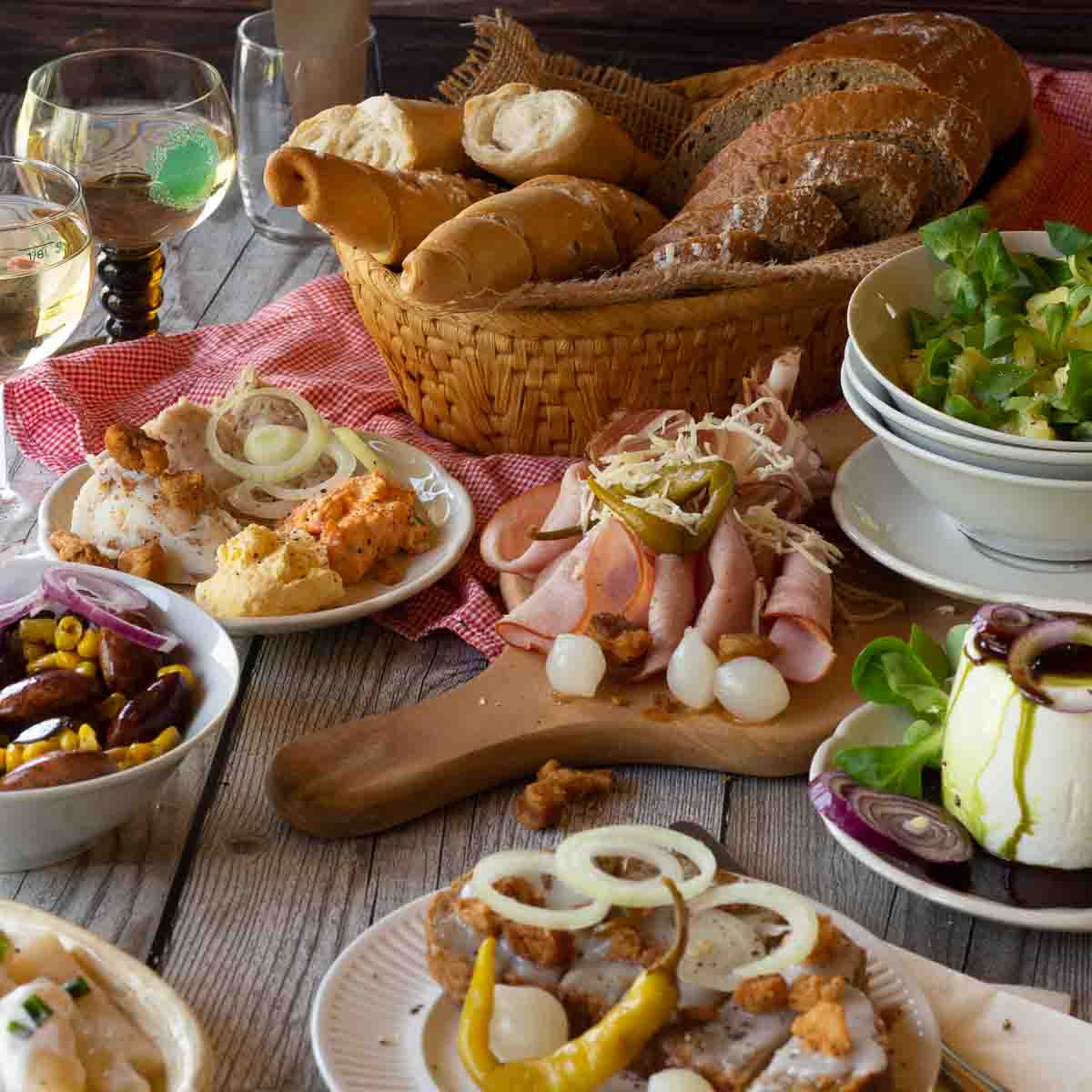This post is an ongoing collection of culinary traditions that celebrate autumn in Austria. Around Thanksgiving, St. Martin’s Day on November 11, and All Saints’ Day on November 1, there are various dishes that make this season truly special.
If there’s a traditional dish from your region that isn’t mentioned here, I’d love to hear about it in the comments below!

Austrian Thanksgiving (Erntedank)
The Thanksgiving festivals in Austria, which are not on one specific day, but rather spread through whole september and october, marks the festive conclusion of the harvest season and is deeply rooted in rural tradition. In towns and villages, the fruits of the fields are celebrated with decorated harvest crowns, parades, and regional specialties. Culinary delights center around gratitude — from freshly baked bread and hearty autumn soups to sweet treats made with apples, nuts, and grapes.
Kirchweihnudeln
Kirchweihnudeln, also known as Kirtanudeln, are a traditional festive pastry enjoyed at many church fairs and local festivals (Kirtage) throughout Austria. These golden-brown farmhouse doughnuts or Kiachl, fried in lard, can be served sweet with powdered sugar and jam or savory with sauerkraut. In some regions, the dough is even shaped and twisted into intricate, decorative forms.
Here is a basic recipe for the Krapfen dough and here is a short video tutorial on how to form them.
Sturm & Heurigenzeit
Wenn im Herbst die Weinlese beginnt, ist auch die Sturmzeit nicht mehr weit! Der süß-prickelnde, noch gärende Jungwein wird vielerorts traditionell mit herzhaften Schmankerln wie Brettljause oder Kastanien genossen. Ein Glas Sturm beim Heurigen gehört zum österreichischen Herbst einfach dazu und verbindet Geselligkeit, Genuss und jahrhundertealte Weinbaukultur.
Here you can find alle my traditional Viennese Heurigen recipes.

All Saints’ Braid (Allerheiligenstriezel)
The Allerheiligenstriezel is a traditional Austrian sweet yeast bread baked around November 1st, All Saints’ Day, and in some regions, it’s gifted by godmothers to their godchildren. With its golden-brown crust, delicate buttery aroma, and distinctive braided shape, it symbolizes friendship, love, and remembrance of the departed. Whether enjoyed plain, with butter, or with jam, this braided loaf is an essential part of All Saints’ Day and brings sweetness to the quiet days of autumn.
Here is a fluffy and delicious Striezel recipe.
Ladder to heaven (Allerheiligensteigerl or “Himmelsleiter”)
The Allerheiligensteigerl, also known as the “Heaven’s Ladder,” is an old and now rarely seen pastry that was traditionally baked in rural parts of Austria for All Saints’ Day. Its shape resembles a small ladder — a symbol of the souls’ ascent to heaven. With its simple sweet dough and deep symbolic meaning, the Steigerl is a beautiful example of how faith and rural baking traditions intertwine.
Recipe for "ladder to heaven" from lilvienna.
Kletzenbrot
Kletzenbrot is a classic Austrian autumn and winter bread, especially popular in the regions of Tyrol, Salzburg, and Carinthia. It’s a dark whole-grain loaf enriched with dried pears (Kletzen), as well as nuts, raisins, and warming spices. Traditionally, it’s baked around All Saints’ Day and, depending on the region, either gifted or cut for the first time in Advent.
Kletzenbrot - Austrian Christmas Fruit Loaf Recipe by austria.info.
Martin’s Pretzel (Martinsbrezel)
The Martinsbrezel is a traditional pastry that is given as a gift around November 11, St. Martin’s Day, in many regions of Austria. It symbolizes sharing and compassion — in remembrance of St. Martin, who famously shared his cloak with a beggar. Whether made from sweet yeast dough or crisp white bread, the Martinsbrezel is a delicious symbol of kindness and warmth as winter begins.
Sweet Pretzel Recipe by Dirndl Kitchen.
Martin’s Crescent Roll (Martinskipferl)
As part of the Martinskipferl tradition, people share a crescent-shaped pastry with someone else. Usually made from sweet yeast dough or curd cheese dough, the crescents are baked (or bought) around St. Martin’s Day on November 11 and often given to children. It commemorates the charitable act of St. Martin, who shared his cloak with a beggar, symbolizing kindness and community. The Martinskipferl is a beloved treat during lantern processions, and it’s customary to share it with someone — just as St. Martin once did.
Austrian Crescent Recipe by homebaking.at.
Martin’s Goose (Martinigansl)
The Martinigansl is one of Austria’s most beloved traditional dishes associated with St. Martin’s Day on November 11 and holds a firm place in the country’s autumn cuisine. Served with red cabbage, bread dumplings, and rich gravy, the roast goose becomes a true feast enjoyed by families and in cozy inns across the country. The custom dates back to the legend of St. Martin, who, according to tradition, hid to avoid being appointed bishop — but was betrayed by the loud cackling of the geese.
Here you’ll finda Martinigansl recipe with a chestnut–plum stuffing and the traditional side dishes.
Martiniloben
Martiniloben is a traditional Austrian wine festival celebrated around St. Martin’s Day on November 11 the Burgenland region. On this day, farmers and winemakers give praise and thanks for their harvested grapes and the new wine of the year — a joyful expression of gratitude for a successful harvest. The celebration is often accompanied by festivals, music, and culinary specialties such as Martinigansl or sweet St. Martin pastries, making it a delightful blend of religious tradition, winemaking culture, and autumnal indulgence.
Törggelen
Törggelen is a autumn tradition in South Tyrol and parts of Tyrol, closely linked to viticulture and the grape harvest. During this time, the first wines of the new vintage are tasted, usually accompanied by hearty seasonal fare such as roasted chestnuts, cured bacon, sausages, and farmhouse bread. Guests wander from one wine tavern or farmhouse inn to another, enjoying the young wine, celebrating the harvest, and sharing in good company — a culinary highlight that captures the true flavor and spirit of autumn in the Alps.

Ich freu mich über deine Rückmeldung zum Rezept in den Kommentaren!